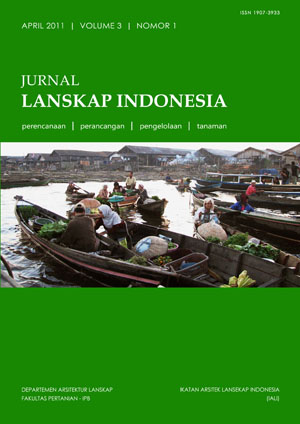PENGEMBANGAN KAWASAN PASCA PERTAMBANGAN TIMAH: PENDEKATAN KONSEP ECO-DEVELOPMENT
Abstract
Eco development gave top priority to considerationsin sustainable development. An approachment need to be applied in environmentally prospective on spatial planning, by integrating sub sistem of planning aspects whichemphasizes on ecosystem and prediction on its success in order to integrate objectives in economy, social-cultural and environmental. Ex-mining sites in Indonesia need a primary attention due to the environmental damages they caused, by means of reclamation as an effort to restore and increase the quality of its natural resources. Primary consideration in its developing concept is the improving of regional quality with concistency in keeping local potention and characteristic in functional and aesthetic considerations; and give a positive impact for society in ecology, economy, social and cultural. Landscape planning as a developing idea fully responsible to realize the success of exploitation and development of ex-mining sites. Pantai Tanjung Tinggi in Bangka Belitung were choosen as a sample case of post-mining site planning through strategic approachment for a development of beach recreational site, Eco-park; a New Landscape in ex-mining Development based on sustainable local wisdom.Downloads
This journal permits and encourages authors to post items submitted to the journal on personal websites or institutional repositories both prior to and after publication, while providing bibliographic details that credit, if applicable, its publication in this journal. However, after the article is submitted and published in this journal, it is fully copyrighted by the Jurnal Lanskap Indonesia or JLI. If excerpts from other copyrighted works are included, the author must obtain written permission from the copyright owner and give credit to the source in the article. Then, the writer or reader is allowed to copy, share, and redistribute articles/material in any form. But it must still include the appropriate source and credit because the article in this journal is licensed by Creative Commons Attribution 4.0 International License (CC BY 4.0).
I. Proposed Policy for Journals That Offer Open Access
Authors who publish with this journal agree to the following terms:
- Authors retain copyright and grant the journal right of first publication with the work simultaneously licensed under a Creative Commons Attribution License that allows others to share the work with an acknowledgement of the work's authorship and initial publication in this journal.
- Authors are able to enter into separate, additional contractual arrangements for the non-exclusive distribution of the journal's published version of the work (e.g., post it to an institutional repository or publish it in a book), with an acknowledgement of its initial publication in this journal.
- Authors are permitted and encouraged to post their work online (e.g., in institutional repositories or on their website) prior to and during the submission process, as it can lead to productive exchanges, as well as earlier and greater citation of published work (See The Effect of Open Access).
II. Proposed Policy for Journals That Offer Delayed Open Access
Authors who publish with this journal agree to the following terms:
- Authors retain copyright and grant the journal right of first publication, with the work after publication simultaneously licensed under a Creative Commons Attribution License that allows others to share the work with an acknowledgement of the work's authorship and initial publication in this journal.
- Authors are able to enter into separate, additional contractual arrangements for the non-exclusive distribution of the journal's published version of the work (e.g., post it to an institutional repository or publish it in a book), with an acknowledgement of its initial publication in this journal.
- Authors are permitted and encouraged to post their work online (e.g., in institutional repositories or on their website) prior to and during the submission process, as it can lead to productive exchanges, as well as earlier and greater citation of published work (See The Effect of Open Access).



























